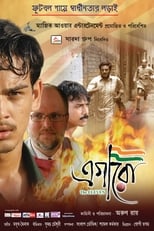The footballing film Egaro (এগারো) takes place in British India in 1911. Subjugated by the English, Bengali natives are second-class citizens in their own country. Some try to succeed by working within the British system, while some are beaten and murdered by police. Some rebel with acts of terrorism.
In this environment of conflict, 11 Bengali men, playing for Mohan Bagan Club (মোহনবাগান ক্লাব), reach the India FA cup final. As the first Indian team to reach this stage, the pressure of national pride is on them to best their British opponents. The main theme of the movie is that these men, as well as the people who influence their lives, all come to understand how important this game is for their country. This game could not just win a trophy, it unites a country. It is slave against master as in Spartacus, or prisoners playing the guards as in Mean Machine.
History
This film induced me to research the British Raj, which I didn’t know is a term for the British rule of the Indian Empire from 1858-1947. Indian nationalism began with the first Indian National Congress in 1885, with the phrase “Bande Mataram” (Hail Motherland). This film takes place a few years after the unpopular partition of Bengal in 1905. The partition was revoked in 1911 about 5 months after the match, and the capital of India was moved to Delhi.
The movie promulgates the idea the Mohan Bagan match had much influence on this move. If this were true, it would be similar to what has been seen throughout the world: the anonymity and passion of soccer stadiums has fomented revolutions. The topic is so relevant today, that there is already a new version of this story in development, to be called 1911.
Repetitive and difficult to follow
To communicate his message, the Director often uses the same scenes repeatedly, which I found a little annoying. On the upside, you can rewatch the main scenes again during the closing credits, which were posted on youtube to showcase one of the film’s songs.
Despite the repetition, I still found most of the film quite difficult to follow. The English sub-titles often don’t make sense, aren’t even there, or seem too short, such as five words used to reflect a long spoken passage. And because there are so many different stories and some of the players look too similar for my eyes to differentiate, I had trouble following who was who.
Even in the film, during the game Mohan Bagan uses a tactic of forwards switching places often, knowing that the British opponents will have trouble identifying and man-marking the star forward. But the Brits figure out the star is wearing a red string bracelet and target him that way, until he takes it off. (Bad refereeing that – improper equipment 🙂).
The soccer
The re-enactment of the fan excitement at game day is the most convincing part of the film. The match takes up 35 minutes of this 2 hour film. The game was filmed over 14 days on the dirt-grass fields of Howrah Maidan in oppressive heat. Director Arun said he used several pro footballers in the cast and all the actors underwent 6 months of training, but the soccer is mostly portrayed through close-ups of fouls and a little bit of passing. True to the time, the Brits had boots while all but one Mohan Bagan player competed barefoot.
Another thing that confused me was the portrayal of British players: none of them looked or sounded British. I heard what sounded like German and South African accents, and one “Brit” for sure looked like a Pacific Islander rugby player. Director Arun said they recruited foreigners for the film as they exited the airport. Maybe they weren’t even successful at that, because a lot of the “Brits” looked mixed-race to me 🙂. That’s a nitpick.
Currently viewable in the USA on Amazon Prime.
6 Soccer Movie Mom Rating = 6
Resources:
- Released: 2011-01-21 (India)
- In Bengali or maybe Hindi with English sub-titles
- Egaro (এগারো) is Bengali for the number 11.
- IMDB
- WIKI
- Director: Arun Roy
- Stars: Ronodeep Bose (as the winning goal scorer Abilash Ghosh)
- The trailer is no longer available
- My favorite song from the film

